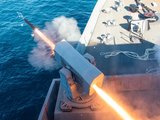FREMM Aquitaine continues verification test firings
The frigate Aquitaine, a part of the multi-mission frigate program (FREMM), fired an Exocet MM40 surface-to-surface missile on 12 May and a naval cruise missile on 19 May at a DGA missile testing centre off Levant Island.
These tests marked the first time that a European surface ship has fired a European cruise missile. The firings were prepared by the DGA teams, the French Navy, missile manufacturer MBDA, and DCNS. They were held as part of the verification of the FREMMs' technical capabilities before they enter active service.
The firing of these missiles marks a major milestone after the successful firing of an Aster 15 anti-aircraft missile in 2013 and the commissioning of the MU 90 lightweight torpedo on the Caiman marine helicopter on 13 March.
FREMMs are heavily-armed warships with naval cruise missiles, Exocet MM40 anti-ship missiles, Aster anti-aircraft missiles and MU90 anti-submarine torpedoes. They can accommodate a Caiman marine helicopter, special forces and their equipment. A total of six FREMMs are due to be delivered before mid-2019.
Related Equipment in Defence Insight
More from Naval Warfare
-
![European navies line up $105.8 billion in unawarded contracts for 2026]()
European navies line up $105.8 billion in unawarded contracts for 2026
France, Germany and Italy lead the way on unawarded naval defence opportunities that could be awarded this year, but across Europe countries are ramping up their spending efforts to face geopolitical challenges.
-
![Spain’s F100 upgrade mirrors Aegis modernisation paths in allied navies]()
Spain’s F100 upgrade mirrors Aegis modernisation paths in allied navies
The Spanish Navy’s Alvaro de Bazan-class of air defence frigates will receive the latest Aegis Weapon System technology among other modernisations to extend the service life to 2045.
-
![UK’s Fleet Solid Support ship programme deemed on track despite steel supply concerns]()
UK’s Fleet Solid Support ship programme deemed on track despite steel supply concerns
Shipbuilders are saying the programme is going ahead on time as the government estimates 7.7 million tonnes of steel are needed for 2026 infrastructure projects.
-
![Raytheon unveils details of its proposal for the US Navy/NATO ESSM Next Significant Variant]()
Raytheon unveils details of its proposal for the US Navy/NATO ESSM Next Significant Variant
In an exclusive interview with Shephard, Raytheon’s VP of Shipboard Missiles disclosed what improvements the company plans to offer for the Sea Sparrow NSV.






















